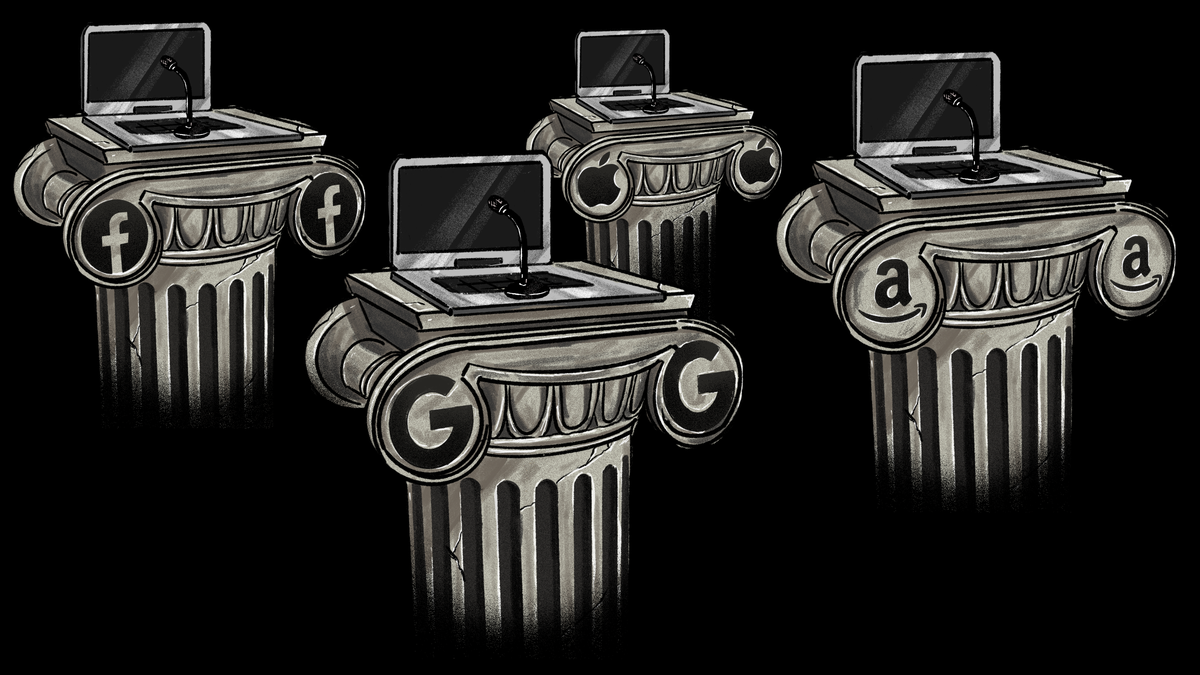
Amazon, Apple, Facebook and Google Prepare for Their ‘Big Tobacco Moment’ (Published 2020)
The tech C.E.O.s will appear together at a congressional hearing on Wednesday to argue that their companies do not stifle competition.
After lawmakers collected hundreds of hours of interviews and obtained more than 1.3 million documents about Amazon, Apple, Facebook and Google, their chief executives will testify before Congress on Wednesday to defend their powerful businesses from the hammer of government.
The captains of the New Gilded Age — Jeff Bezos of Amazon, Tim Cook of Apple, Mark Zuckerberg of Facebook and Sundar Pichai of Google — will appear together before Congress for the first time to justify their business practices. Members of the House judiciary's antitrust subcommittee have investigated the internet giants for more than a year on accusations that they stifled rivals and harmed consumers.
The hearing is the government's most aggressive show against tech power since the pursuit to break up Microsoft two decades ago. It is set to be a bizarre spectacle, with four men who run companies worth a total of around $4.85 trillion — and who include two of the world's richest individuals — primed to argue that their businesses are not really that powerful after all.
And it will be a first in another way: Mr. Zuckerberg, Mr. Pichai, Mr. Bezos and Mr. Cook will all be testifying via videoconference, rather than rising side-by-side for a swearing-in at a witness table in Washington. Perhaps appropriately, their reckoning will be broadcast online.
"It has the feeling of tech's Big Tobacco moment," said Gigi Sohn, a former senior adviser at the Federal Communications Commission and a fellow at Georgetown University's law school, referring to the 1994 congressional appearance of top executives of the seven largest American tobacco companies, who said they did not believe that cigarettes were addictive.
The hearing, which caps a 13-month investigation by the House subcommittee, will be closely watched for clues that could advance other antitrust cases against the companies. The Federal Trade Commission, for one, is preparing to depose Mr. Zuckerberg and other Facebook executives in its 13-month probe of the social network. The Justice Department may soon unveil a case against Google. And an investigation into Apple by state attorneys general also appears to be advancing.
The length of the hearing may also be prolonged since the antitrust issues facing Apple, Facebook, Google and Amazon are complex and vastly different.
Amazon is accused of abusing its role as both a retailer and a platform hosting third-party sellers on its marketplace. Apple has been accused of unfairly using its clout over its App Store to block rivals and to force apps to pay high commissions. Rivals have said Facebook has a monopoly in social networking. Alphabet, the parent company of Google, is dealing with multiple antitrust allegations because of Google's dominance in online advertising, search and smartphone software.
Democrats may also veer off the topic of antitrust and bring up concerns about misinformation on social media. Some Republicans are expected to sidetrack discussion with their concerns of liberal bias at the Silicon Valley companies and accusations that conservative voices are censored.
For the chief executives, the hearing will be a test of how they perform under fire. Mr. Bezos, 56, has not previously testified to Congress, while Mr. Cook, 59, and Mr. Pichai, 48, have both testified once before. Mr. Zuckerberg, 36, the youngest of the group, has the distinction of being the veteran: He has answered questions at three congressional hearings in the past two years as Facebook has dealt with issues such as election interference and privacy violations.
For weeks, the tech giants have also waged a lobbying battle to soften any blows. All four chief executives planned to call lawmakers on the House subcommittee in the days before the hearing, said three people with knowledge of the preparations who were not authorized to speak publicly.
Big Tech's rivals have also jockeyed to have their gripes brought up at the hearing, even if for just a few minutes. The House subcommittee has been flooded with proposed questions, documents and letters from the companies' competitors, according to congressional staff and rivals.
"The C.E.O.s don't want to be testifying. Even having this collective hearing creates a sense of quasi-guilt just because of who else has gotten called in like this — Big Pharma, Big Tobacco, Big Banks," said Paul Gallant, a tech policy analyst at the investment firm Cowen. "That's not a crowd they want to be associated with."
Should be interesting.






